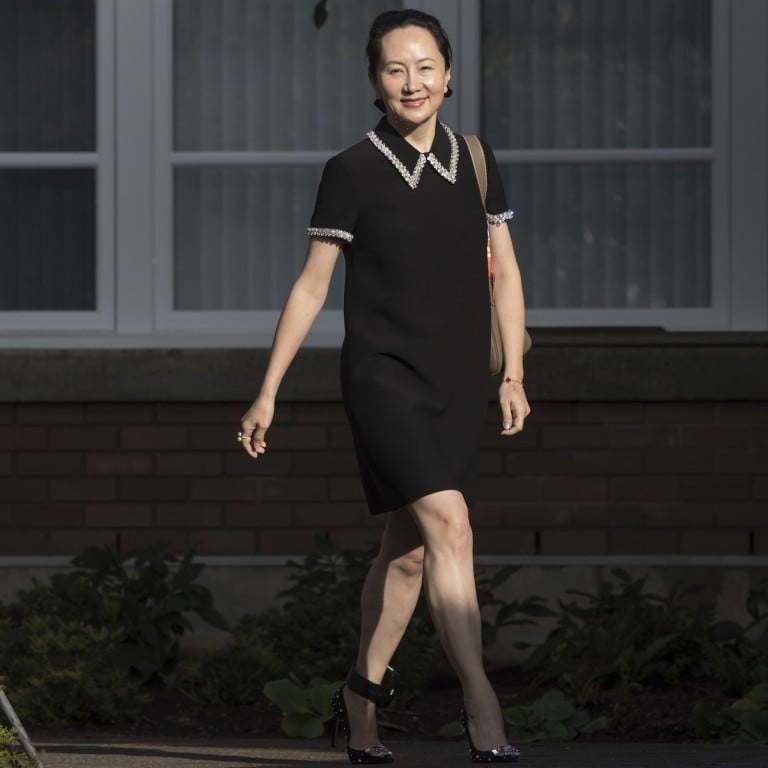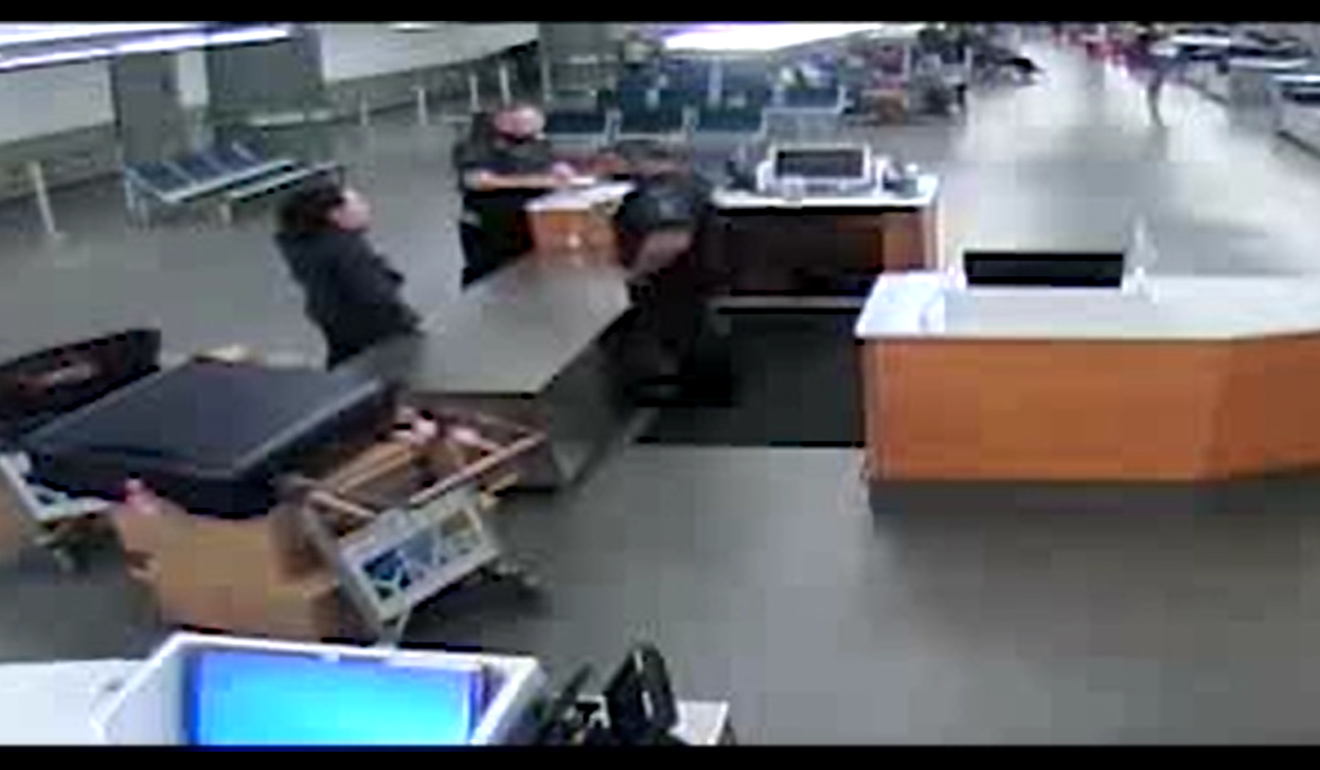
Canada border officers subjected Meng Wanzhou to ‘chilling, serious misconduct’ by seizing devices and keeping arrest warrant secret, lawyers tell court in Huawei extradition saga
- Lawyers for Huawei CFO accused border agents of acting as proxy investigators for the FBI, by delaying arrest so they could question her and gather evidence
- They played a silent video in British Columbia’s Supreme Court that they said showed Meng being questioned about business dealings in Iran
Canadian border officers subjected Huawei executive Meng Wanzhou to “chilling” and “extraordinarily serious misconduct” when they seized her electronic devices and passwords without telling her that she was about to be arrested on an American warrant, her lawyers told a Vancouver court on Tuesday as part of her high-stakes battle to fend off extradition to the US.
Her legal team also played a silent video in court of her being questioned by Canada Border Services Agency officers at Vancouver’s airport on December 1 – before her arrest by Canadian federal police acting on behalf of the US – claiming it showed her being asked about the Chinese tech giant’s business dealings in Iran.
The video and descriptions of the seizure of Meng’s devices were used to bolster the defence claim that she was subjected to an abuse of process by Canadian border agents acting as covert investigators for the FBI.
The hearing is part of a bid by Meng’s lawyers to force Canadian authorities to surrender more documents that they claim could demonstrate the abuse of her rights.

“It’s chilling when you think about it,” said Scott Fenton, one of Meng's lawyers. “These [CBSA] officers know full well the [Royal Canadian Mounted Police] officers are around the corner. They know all about the arrest warrant. The only person who does not know is Ms Meng.”
Tuesday was the second day of a scheduled eight-day evidence disclosure hearing in British Columbia’s Supreme Court, ahead of Meng’s formal extradition hearing, which is expected to begin in January and last until October or November 2020.
Meng, 47, is the daughter of Huawei founder Ren Zhengfei.
Another of Meng’s lawyers, Richard Peck, said CBSA agents had interrogated the Huawei executive about her homes around the world and business affairs without revealing she was the subject of the US warrant. One asked her if the company did business in Iran, he said.
“I reminded the subject that she was the CFO of a multibillion-dollar company,” Peck quoted the agent as saying.
“Those questions relate directly to the allegations that found the warrant and [these] extradition proceedings,” Peck said. He added rhetorically: “What [do] these questions have to do with a routine immigration investigation?”
Judge releases video of Meng Wanzhou being searched at Canada airport
Peck said Tuesday that Meng’s treatment by CBSA officers was “anything but routine”.
Fenton said Meng had suffered “serious violations” of her Canadian charter rights. He argued that it was within Justice Heather Holmes’ powers to stay proceedings on the basis of such abuses.
Fenton referred to the seizure of Meng’s electronic devices by CBSA officers before her arrest as an abuse of process. Crown lawyers now claimed US authorities were no longer interested in the contents of the devices, he said, but “that does not lessen the severity of the abuse”.
He said the CBSA search of Meng was conducted under the “plausible facade” of an immigration examination, but it had an “unlawful aim”.
“In reality … they were exercising their powers for an improper purpose,” Fenton said, namely, gathering evidence for the FBI’s criminal investigation of Meng. He later pointed out that his client had successfully visited Canada more than 50 times in the past decade.
Fenton said there were “strategic omissions” from the CBSA record to obscure the officers’ motives for the search and seizure of Meng’s electronic devices.
“We are not on the proverbial ‘fishing expedition’ in any way,” he said. “We are not relying on conjecture or guesswork or wishful thinking.”
Meng had been subjected to a “pattern of extraordinarily serious misconduct”, said Fenton, and “there was no legitimate purpose to the CBSA’s actions”.
He added: “These are not technical violations. They are purposeful violations of the court order [that Meng's arrest be executed immediately].”
How an HSBC investigation led to charges against Huawei CFO
Instead, Meng’s arrest was delayed by three hours, during which time the CBSA officers effectively acted as proxy investigators for the RCMP and the FBI, Fenton said.
Meng entered court on Tuesday in a short black cocktail dress, encrusted in sequins on the sleeves and collar, and wearing black velvet stilettos, also twinkling with sequins. It was a second eye-catching outfit for Meng this week, and a departure from her earlier courtroom attire. She had previously sported hooded sweatshirts and other casual clothing in court.
She was arrested at the Vancouver airport during a stopover from Hong Kong on her way to Mexico.
The US wants her to face trial for allegedly defrauding HSBC bank, in a case related to Huawei’s supposed business in Iran, which was allegedly in breach of American sanctions.
Monday was devoted largely to Meng’s team building the case that evidence disclosure by the Canadian attorney general’s lawyers – acting on behalf of the US – has been inadequate.
Peck said on Monday that Canadian border officers had improperly delayed Meng’s arrest at the airport in order to conduct their “covert criminal investigation”.
The arrest also sent China-Canada relations plunging to their lowest depths in years. China has detained two Canadians, Michael Spavor and Michael Kovrig, accusing them of espionage, but Canada says the detentions are retribution for the Meng case.
Meng is free on C$10 million (US$7.5 million) bail, living in a C$13 million mansion that is one of two homes she owns in Vancouver. A former permanent resident of Canada, she has been a frequent visitor to the city in recent years, including six visits in 2018 before her arrest on her seventh.
The hearing was adjourned until Wednesday morning.

